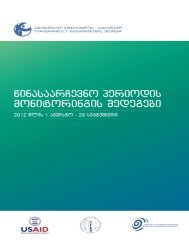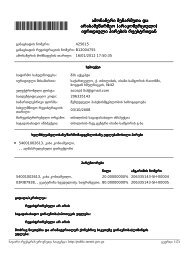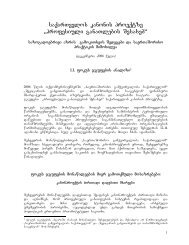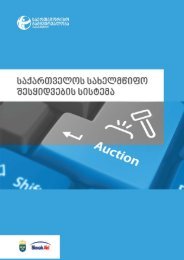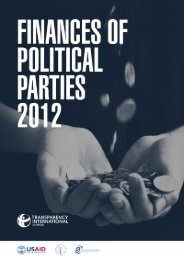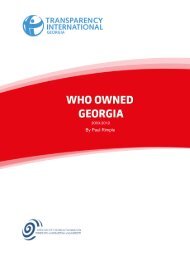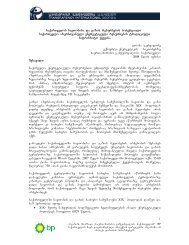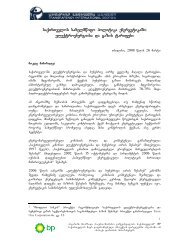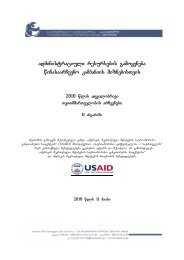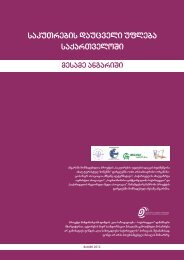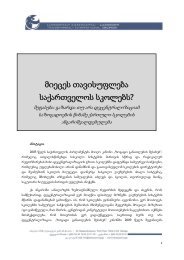The case of Mestia
The case of Mestia
The case of Mestia
You also want an ePaper? Increase the reach of your titles
YUMPU automatically turns print PDFs into web optimized ePapers that Google loves.
Problems related to the Protection<strong>of</strong> Property Rights - <strong>The</strong> <strong>case</strong> <strong>of</strong> <strong>Mestia</strong>This Report is prepared within a framework <strong>of</strong> the project “Protection <strong>of</strong> Property Rights inNew Touristic Zones <strong>of</strong> Georgia” by four Non-Governmental Organizations: Association “GreenAlternative”, “Georgian Young Lawyers’ Association”, “Transparency International - Georgia”and “Georgian Regional Media Association”.<strong>The</strong> Project is implemented with inancial support from the “Open Society - Georgia” Foundation. <strong>The</strong> views, opinions andstatements expressed by the authors are theirs only and do not necessarily relect the position <strong>of</strong> “Open Society - Georgia”Foundation. “Open Society - Georgia” Foundation is not responsible for the content <strong>of</strong> the information material.July 12011
CONTENTDeinition <strong>of</strong> Terms .................................................................................................................................................................................. 3About the Project .................................................................................................................................................................................... 4Summary <strong>of</strong> the Report ......................................................................................................................................................................... 5Traditional possession <strong>of</strong> land and registration-related diiculties ................................................................................ 5Infrastructural projects vs. interests <strong>of</strong> the local population .............................................................................................. 5Selective justice ................................................................................................................................................................................. 5Prospects for Tourism Development in Svaneti ........................................................................................................................... 6A Few Things About Svaneti ................................................................................................................................................................ 7Traditional Possession – Issue Beyond Statutory Regulation .................................................................................................. 9Diiculties related to Registration <strong>of</strong> Title to Land Plots .........................................................................................................10Registration <strong>of</strong> Title to Land Through Selective Justice and Coniscated Land Parcels ...............................................12<strong>Mestia</strong> Public Registry - Incompetence or Political Mission ..................................................................................................15Political Project <strong>of</strong> Tourism Development in Zemo Svaneti ...................................................................................................17Contradictory Approach <strong>of</strong> Authorities towards Traditional Possession ..........................................................................18Conclusions and Recommendations .............................................................................................................................................202
DEFINITION OF TERMSLand in lawful possession (use) - Agricultural or non-agricultural land plot in state ownership with or without buildings/constructions (completed, in the building process or demolished), in respect <strong>of</strong> which (land plot or building-construction)the right <strong>of</strong> lawful possession <strong>of</strong> a physical person, legal entity <strong>of</strong> private law or other organizational entity under law hasoriginated prior to enactment <strong>of</strong> this Law, as well as land registered in the technical inventory archive and occupied arbitrarilyprior to 1994; (5.12.2008 N 614)Arbitrarily occupied land - Agricultural or non-agricultural land plot in state ownership arbitrarily occupied by a physicalperson prior to enactment <strong>of</strong> this Law, with a residential house (built or demolished) or a non-residential building (built)on it, as well as an arbitrarily occupied land plot (with or without a building) adjacent to a land plot under the ownershipor lawful possession <strong>of</strong> an interested physical person, the area <strong>of</strong> which is smaller than the area <strong>of</strong> land plot in ownershipor lawful possession, as well as an arbitrarily occupied land plot adjacent to a land plot under the ownership or lawful possession<strong>of</strong> a legal entity <strong>of</strong> private law with a non-residential building (built) on it, the area <strong>of</strong> which [land plot] is smallerthan the area <strong>of</strong> land plot in the ownership or lawful possession, and which at the moment <strong>of</strong> requested recognition <strong>of</strong>the right to ownership had not been disposed <strong>of</strong> by the state.Traditional possession <strong>of</strong> land - Traditional land-related proprietary rights established historically based on the political,economic and social system, which [the rights] are deined by the customs <strong>of</strong> the indigenous population.3
ABOUT THE PROJECT<strong>The</strong> infringement <strong>of</strong> property rights in Georgia has become more frequent in recent years. <strong>The</strong> absence <strong>of</strong> concrete legalregulations for the protection <strong>of</strong> citizens’ property rights, mechanisms <strong>of</strong> respective compensation for the injured persons,and a uniform state policy on “resettlement” in general, as well as the non-awareness <strong>of</strong> citizens <strong>of</strong> their own rights andobligations enables interested parties to breach property rights through improper application or interpretation <strong>of</strong> law.For this very reason, at the initiative and inancial support <strong>of</strong> the “Open Society – Georgia” Foundation, the project “Protection<strong>of</strong> Property Rights in New Touristic Zones” was launched in 2011. <strong>The</strong> project is implemented by four local non-governmentalorganizations (NGOs): “Transparency International – Georgia”, “Georgian Young Lawyers’ Association”, “GeorgianRegional Media Association”, and the Association “Green Alternative”.<strong>The</strong> project aims to promote property rights protection in new touristic regions (namely Samegrelo-Zemo Svaneti andAdjara); promote the application in practice <strong>of</strong> property rights protection guarantees recognized under the law, Constitution,and international norms; minimize the threats <strong>of</strong> property violations and render legal assistance to already injuredpopulation; raise public awareness on the legalization and protection <strong>of</strong> property by a relevant media campaign; andinitiate the development <strong>of</strong> a “resettlement” policy.Within the project framework, the irst report 1 was prepared in 2011, which concerned legalization <strong>of</strong> the property <strong>of</strong> 271residents in the village <strong>of</strong> Gonio and subsequent revocation <strong>of</strong> ownership certiicates. In addition, a report on breaches<strong>of</strong> property rights in Anaklia is planned. <strong>The</strong> current report describes the facts <strong>of</strong> infringement <strong>of</strong> property rights and obstaclesencountered by the local population registering their ownership rights to land plots in the district <strong>of</strong> <strong>Mestia</strong> (ZemoSvaneti).1 Report: “Problems related to the Protection <strong>of</strong> Property Rights - <strong>The</strong> <strong>case</strong> <strong>of</strong> village Gonio” http://www.osgf.ge/iles/publications/2011/Gonio_GEO_WEB.pdf4
SUMMARY OF THE REPORTAs <strong>of</strong> today, obtaining and protecting the ownership rights to real property in <strong>Mestia</strong> is a considerable challenge. Registration<strong>of</strong> land in ownership is hindered, mainly by artiicial barriers set up by state agencies for protracting the registrationprocess. <strong>The</strong> Commission for Recognition <strong>of</strong> Right to Ownership, which is authorized to register ownership to landplots, is non-functional owing to strict legislation requirements. Land plots in possession <strong>of</strong> the local population are beingmassively dissected and decimated due to various construction works. Citizens are deprived <strong>of</strong> the possibility to register- based on lawful possession - ownership rights to land plots their families have possessed for centuries and which theyhave documents required under law for registration purposes.TRADITIONAL POSSESSION OF LAND AND REGISTRATION-RELATED DIFFICULTIESLand plots have in fact never been legally registered in the high mountainous regions <strong>of</strong> Georgia, such as Svaneti. For centuries,the local population has owned property by inheritance and disposed land plots as distributed (or re-distributed)based on agreements between ancestors.Residents in <strong>Mestia</strong> have encountered special diiculties in registering traditionally owned land plots (covering approximately80% <strong>of</strong> the <strong>Mestia</strong> district). <strong>The</strong> two grounds <strong>of</strong> the legalization <strong>of</strong> ownership rights prescribed under Georgianlegislation - “arbitrary occupation” and “lawful possession” - in most <strong>case</strong>s, do not conform to the ownership form foundin <strong>Mestia</strong> (and in Svaneti generally) - traditional possession.INFRASTRUCTURAL PROJECTS VS. INTERESTS OF THE LOCAL POPULATIONInfrastructural projects designed and implemented in Zemo Svaneti (airport, ski-run, cable-way, hotel) have been mostlycarried out on land plots in traditional possession.<strong>The</strong> construction <strong>of</strong> infrastructural projects (airport, ski-run) were initiated in such a way that locals were deprived <strong>of</strong> thepossibility to register ownership rights to land plots in traditional possession in these territories. Compensation has notbeen disbursed to the local population because this requires registration <strong>of</strong> land plots in the citizens’ ownership. Accordingto our data, as a result <strong>of</strong> the construction <strong>of</strong> Hatsvali skiing complex, at least 20 families are unable to register landin ownership, therefore, they cannot be compensated.SELECTIVE JUSTICE<strong>The</strong> <strong>Mestia</strong> Public Registry has imposed restrictions, and a so-called “forbidden” registration zone (“other side <strong>of</strong> water” territory,see below) exists. <strong>The</strong> registry does not accept documents for the registration <strong>of</strong> parcels within this zone. However,there are <strong>case</strong>s when the public registry registers land plots in the “forbidden” registration zone in the citizens’ ownership.In one <strong>case</strong>, land which had been in traditional possession for centuries ended up in the hands <strong>of</strong> a Parliamentarian’s son,who built a hotel on the plot.Persons engaged in the business <strong>of</strong> tourism and infrastructure development in <strong>Mestia</strong> do not feel obliged to compensatethe local population for divided and destroyed land. <strong>The</strong>y determine the issue <strong>of</strong> compensating victims at their owndiscretion.5
PROSPECTS FOR TOURISM DEVELOPMENT IN SVANETIBoth local and international experts have reiterated that tourism may become the potential backbone <strong>of</strong> Svaneti developmentand economy. <strong>The</strong>y also stated that the basic infrastructure for tourism development required substantial investmentsfrom the state. 2 <strong>The</strong> Government has followed this recommendation and a new airport and runway were builtin <strong>Mestia</strong>, along with an 8 kilometer road to the Hatsvali skiing complex, a 1400 meter ski-run and chairlift ; the center <strong>of</strong><strong>Mestia</strong> center was renovated and the Zugdidi-Jvari-<strong>Mestia</strong>-Lasdili road was launched, etc. 3 In short, major technical andinfrastructural problems were solved .However, substantial research in the attitude <strong>of</strong> local population towards development <strong>of</strong> tourism in Svaneti, has notbeen carried out. One study <strong>of</strong> the sustainable development capacity <strong>of</strong> Zemo Svaneti (2006) 4 revealed that the majority<strong>of</strong> local residents saw less prospects that the development <strong>of</strong> tourism would improve their lives - in their words, engagingin the tourism business requires certain capital investments, which only certain individual families can aford. Hence,development <strong>of</strong> tourism for them would be associated with the further strengthening <strong>of</strong> already wealthy families and notthe development <strong>of</strong> the region in general. 5Unfortunately, the authorities did not consider potential conlicts and adverse efects related to the development <strong>of</strong> tourism,6 including the issue <strong>of</strong> land, which for Svans 7 is an inseparable component <strong>of</strong> their identity. <strong>The</strong> disruption <strong>of</strong> relationsbuilt around ownership <strong>of</strong> land by the subsequent loss <strong>of</strong> land plots, which were the sole means <strong>of</strong> subsistencethroughout the centuries, were completely ignored.2 Strategic Options towards Sustainable Development in Mountainous Regions. A Case Study on Zemo Svaneti, Georgia. Centre <strong>of</strong> Advanced Trainingin Rural Development. 20063 http://www.mrdi.gov.ge/?page=news1&id=139&lang=1; http://www.1tv.ge/News-View.aspx?Location=14322&LangID=14 Strategic Options towards Sustainable Development in Mountainous Regions. A Case Study on Zemo Svaneti, Georgia. Centre <strong>of</strong> Advanced Trainingin Rural Development. 20065 Hotel “Tetnuldi” has emerged in 2010 as a serious competitor <strong>of</strong> Svanetian guesthouses. Over 2 million Dollars have been invested in construction<strong>of</strong> this four-star hotel. <strong>The</strong> project was implemented within a framework <strong>of</strong> “Millennium Challenge Georgia” Fund and one <strong>of</strong> its founders is TezoJapharidze - former local sportsman and currently active businessman in Russia - “New hotel in Svaneti aims to develop tourism and economy”, <strong>The</strong>Financial, Tbilisi, 16 July 2010, 15:02, http://www.inancial.ge/; “First world-class hotel opened up in Svaneti”, <strong>The</strong> Financial, Tbilisi, 16 June 2010, 16:50,http://www.inancial.ge/; “<strong>The</strong> Svans do not believe in “urbanization” <strong>of</strong> <strong>Mestia</strong>”, Internet.ge Society, 23 December 2010, 18:05, http://www.internet.ge/.6 For instance, a signiicant practical aspect for development <strong>of</strong> ski tourism, such as climate change, has not been foreseen either. Pursuant to the UNenvironmental program survey, skiing industry is among the sectors experiencing strong adverse efects <strong>of</strong> climate change, reasons being increasinglyunpredictable volume <strong>of</strong> snow due to climate change and reducing economic proitability <strong>of</strong> this business ield with respect to resorts locatedwithin the sea level - 2000 meter altitude range (Filka Sekulova, <strong>The</strong> discourse <strong>of</strong> skiing: Kabul-Ezerata-Panichishte a social cost beneit analysis, VrijeUniversiteit, Amsterdam). <strong>Mestia</strong> is located at the altitude <strong>of</strong> 1500 meters, which means that there will be a need to cover ski-runs with artiicial snow.7 http://liberali.ge/turizmis-ganvitareba-sakutrebis6
A FEW THINGS ABOUT SVANETIDiverse factors determine Svaneti’s individuality and uniqueness:geographic location and climate, rich natural resourcesand landscape, cultural-historic monuments, distinguished traditions and customs.Svaneti is divided in two major parts - Zemo (upper) and Kvemo (lower) Svaneti 8 . Zemo Svaneti is located in northwesternGeorgia at an altitude as high as 2,200 meters. Its administrative center, <strong>Mestia</strong>, is 140 km away from Zugdidi, the capital<strong>of</strong> the Samegrelo-Zemo Svaneti region and 540 km from Tbilisi. <strong>The</strong>re are two roads to Zemo Svaneti – one from Zugdidivia Khaishi, and the other from Lentekhi (Kvemo Svaneti) via Ushguli, which is closed during the winter.<strong>The</strong> majority <strong>of</strong> the population in Svaneti is ethnically Georgian - Svans, who adhere to age-old customs and lifestyle. <strong>The</strong>yhave their own language – Svanetian 9 - which is used in everyday life. Presumably, their unique nature was caused partially bygeographic “isolation” 10 and severe natural conditions. Its remoteness made it less exposed to external or internal threats. –Forexample, the country’s secular and ecclesiastical treasures would be brought to Svaneti for safekeeping, as conquerors rarelyreached the region. However, Svaneti constantly had to protect its uniqueness – and maintainits social and cultural identity,which is favorable and exotic to some, and “wild”, and “unclear” to many others. Tsarist Russia tried to “tame” this distant provinceby imposing taxes and forcing military conscription. During the Communist period, the Svans were deprived <strong>of</strong> ownershiprights to their patrimonial heritage, as it had become the collective property <strong>of</strong> the Soviet authorities. Nevertheless, the Svan’straditional land ownership principle proved to be quite efective. When lands coniscated by the Communists were returned,the Svans regained their patrimonial land plots absolutely painlessly and without any conlicts among themselves , despite thefact that most did not have oicial documentation conirming ownership rights. 11 <strong>The</strong> Svans settled this issue and availableland resources were distributed among families and the ownership rights to land is inherited from the fathers. 12Svaneti’s rich natural resources attracted the attention <strong>of</strong> the Soviets – the Enguri hydroelectric power plant was built onEnguri river and began operations in 1987. It is the highest concrete arch dam in the world and has a total capacity <strong>of</strong>1320 MWs 13 . <strong>The</strong> successful project, however, brought about serious ecological and social problems for the locals – foresttracts were looded, a “dead” water reservoir was created, humidity increased considerably, which had an adverse efecton the agricultural activities <strong>of</strong> the local population, as well as on their health. 14 Implementation <strong>of</strong> a second similar projectwas put on the agenda – construction <strong>of</strong> the Khudoni hydroelectric power plant, however, gradual fading <strong>of</strong> the Communistrule and a serious wave <strong>of</strong> protests in the 1980s have suspended this process temporarily. 15 Construction <strong>of</strong> theKhudoni Dam is still on the agenda and despite negative attitude <strong>of</strong> environmentalists and the local population, a politicaldecision on implementation <strong>of</strong> this project has in fact been already made. 16 If the Khudoni Dam is built, the village <strong>of</strong>Khaishi and adjacent villages will be looded and some 2000 local residents will have to be resettled. <strong>The</strong> local ecosystemwill also be signiicantly damaged. 17Zemo Svaneti is a highly active avalanche region. Of the 338 settlements in Georgia exposed to avalanche, 107 are inSvaneti (Zemo, Kvemo Svaneti and the Dali Gorge). 96% <strong>of</strong> the Zemo Svaneti territory is in an avalanche zone, while 41%<strong>of</strong> the territory is entirely exposed to avalanche. 18 Many experts believe that developing large infrastructure projects insuch complex zones without properly calculating the risks <strong>of</strong> environmental impact and natural calamities poses a threatto both the local population and tourists.8 http://ka.wikipedia.org/wiki/Svaneti9 <strong>The</strong>re are difering opinions in the Georgian society about the Svanetian being a language or dialect, which at a certain degree are caused bydissent between linguists. Discourse over this subject is beyond the scope <strong>of</strong> our report, however, we note hereby that on the oicial web page <strong>of</strong>the Government <strong>of</strong> Georgia, the Svanetian is mentioned among the Georgian language-dialects: http://www.government.gov.ge/index.php?lang_id=GEO&sec_id=193##710 Which was <strong>of</strong>ten accompanied by cultural, social, and economic “isolation” as well (T.P)11 Meeting with the local population, CTC oice, <strong>Mestia</strong>, 26 March 2011.12 It is hard to clarify from the locals exactly when had the ancestors received their land. <strong>The</strong> locals’ belief in fairness <strong>of</strong> mechanism <strong>of</strong> land inheritanceis so strong that they never doubt it (T.P.).13 http://www.engurhesi.ge14 http://www.open.ge/index.php?m=94&y=2002&art=1260215 <strong>The</strong> Khudoni Dam: A Necessary Solution to the Georgian Energy Crisis? Green Alternative. 200716 http://www.radiotavisupleba.ge/content/article/9502735.html17 <strong>The</strong> Khudoni Dam: A Necessary Solution to the Georgian Energy Crisis? Green Alternative. 200718 Expeditionary and archive materials <strong>of</strong> the Hydro meteorological Institute.7
<strong>The</strong> Georgian authorities’ current program to develop the tourist infrastructure put Svaneti in a complex dilemma. Attractiveopportunities for the country in terms <strong>of</strong> economic development are pitted against the socio-cultural <strong>of</strong> a peoplethat have inhabited the region for centuries. In addition to the potential loss <strong>of</strong> inherited property, many Svaneti residentsare concerned that they are left out <strong>of</strong> the decision making process. No one is against the development <strong>of</strong> the region andthe emergence <strong>of</strong> additional sources <strong>of</strong> income, but a sense <strong>of</strong> unfairness clearly exists among the locals who feel theirfuture is being decided by outsiders who are not allowing locals to participate in the process, let alone considering theiropinions and interests. 1919 Meeting with the local population, CTC oice, <strong>Mestia</strong>, 26 March 2011.8
TRADITIONAL POSSESSION – ISSUE BEYOND STATUTORY REGULATION„We have not bought this land... it’s patrimonial...“75 percent <strong>of</strong> the world’s poor populations live in rural areas. For most <strong>of</strong> these people, their natural resources are themeans <strong>of</strong> subsistence. For those countries dependent on agriculture, key importance is given to ensuring access to landand the possibility <strong>of</strong> adopting decisions on the use <strong>of</strong> land.Compared to other regions <strong>of</strong> Georgia, Zemo Svaneti has rather scarce land resources – its total area is 3045 sq.m, only6.7% <strong>of</strong> which is agricultural land. <strong>The</strong> latter is divided in the following main categories: arable land (7%), hayields (9%),and pastures (84%). According to 2005 data, 41.4% <strong>of</strong> the Zemo Svaneti territory is covered by woodlands.Scarce land resources are <strong>of</strong> special concern considering that agriculture is a main source <strong>of</strong> income for the locals, - cattlebreeding and farming in particular. Svans are totally dependent on land. 20Unfortunately, governments in developing countries <strong>of</strong>ten do not recognize the rights <strong>of</strong> indigenous populations to land. Furthermore, governments <strong>of</strong>ten make decisions on the use <strong>of</strong> land and other natural resources without consulting thepeople directly dependent on these resources. Owing to the absence or lack <strong>of</strong> oicial documents conirming ownershiprights, the risk <strong>of</strong> losing the land and having it taken away by a “foreigner” is especially high in those communities whererelations are based on traditional and custom-oriented rights. Infrastructure projects planned and already implementedin Zemo Svaneti are mostly being carried out on land in traditional possession, mainly pastures and hayields. Since mostlocals have not registered land plots in the public registry, or have registered but lack electronic versions <strong>of</strong> propertyboundaries, it has become diicult to protect the interests <strong>of</strong> traditional land owners. Meanwhile, all attempts to registerland or acquire electronic versions <strong>of</strong> property lines have failed. <strong>The</strong> registry simply refused to accept documents andrejected citizens’ applications. <strong>Mestia</strong> residents blamed the registry’s refusals on “phone calls from Tbilisi,” adding thatrefusals to register lands had followed the President <strong>of</strong> Georgia’s irst televised speeches concerning tourist infrastructuredevelopment in <strong>Mestia</strong>. 21A meeting with the residents <strong>of</strong> Zemo Svaneti, several people who actually had registered their land and had their ownershiprights recognized, stated they weren’t interested in only receiving compensation.”We did not buy this land… it’spatrimonial… we want to leave it with us”, a Zemo Svaneti resident 22 asserted. Moreover, locals claim potential compensationis so insigniicant 23 that it will by no means compensate losses incurred by the deprivation <strong>of</strong> land. Locals have theirown remedy for this complex situation. Thie main demand is to have the opportunity to register land plots in traditionalpossesion, 24 and then they will be able in certain <strong>case</strong>s to either receive single compensation for land plots or keep it andreach an agreement with an investor on seasonal use <strong>of</strong> land. 2520 Strategic Options towards Sustainable Development in Mountainous Regions. A Case Study on Zemo Svaneti, Georgia. Centre <strong>of</strong> Advanced Trainingin Rural Development. 2006; <strong>The</strong> Khudoni Dam: A Necessary Solution to the Georgian Energy Crisis? Green Alternative. 200721 Meetings with the local population, <strong>Mestia</strong>, August-September 2010.22 Meeting with the local population, CTC oice, <strong>Mestia</strong>, 26 March 2011.23 2.5-3 GEL per one square meter.24 Registration fees are also a concern - as usually each family has many small parcels, registering them separately is very expensive. It is desirable toimpose an integrated fee per one family (household).25 Brief report on <strong>Mestia</strong> Situation. Green Alternative. 20109
DIFFICULTIES RELATED TO REGISTRATION OF TITLE TO LAND PLOTSAn overview <strong>of</strong> the history <strong>of</strong> land plot registrations in <strong>Mestia</strong> on the public registry web site demonstrates that the processhas intensiied since 2008. Prior to that, out <strong>of</strong> a population <strong>of</strong> about 15,000 in the <strong>Mestia</strong> municipality, virtually noone had registered ownership <strong>of</strong> land plots.Since 2007, after the creation <strong>of</strong> the Commission for Recognition <strong>of</strong> Right to Ownership, 26 the <strong>Mestia</strong> Municipality Commissionfor Recognition <strong>of</strong> Right to Ownership has vigorously begun to register ownership to land plots. <strong>The</strong> Commission’sheightened activities in <strong>Mestia</strong> can to a certain degree be related to the 2008 parliamentary election campaignandfacilitated by newly simpliied procedures for land registration.Since the elections, legislation has been subjected to considerable amendments. <strong>The</strong> procedure <strong>of</strong> registration <strong>of</strong> ownershipto arbitrarily occupied land plots 27 has become stricter, while the National Agency <strong>of</strong> Public Registry <strong>of</strong> the Ministry<strong>of</strong> Justice has become an authorized body registering ownership to land plots in lawful possession. 28<strong>The</strong> <strong>Mestia</strong> population encountered particular diiculties in registering land plots in traditional possession (comprisingaround 80% <strong>of</strong> the <strong>Mestia</strong> district). <strong>The</strong> problem is that in most <strong>case</strong>s the two grounds <strong>of</strong> legalization <strong>of</strong> ownership rightsprescribed under Georgian legislation - “arbitrary occupation” and “lawful possession” - do not relate to the form <strong>of</strong> ownershipfound in <strong>Mestia</strong> (and in Svaneti generally) - traditional possession.To register ownership rights in <strong>case</strong> <strong>of</strong> “arbitrary occupation” <strong>of</strong> land, some kind <strong>of</strong> building-construction (built or demolished)should be located on land or a land plot should be adjacent to another land plot in the ownership or lawful possession<strong>of</strong> an interested person. <strong>The</strong>re are very few such plots in <strong>Mestia</strong> and Svaneti in general, as the land plots <strong>of</strong> thepopulation (mainly hayields and pastures) are located mostly in mountainous areas and “some kind <strong>of</strong> buildings” haveever existed there.In order to register ownership rights to land in lawful possession, the above-described requirements no longer haveto be met, however, a documentary pro<strong>of</strong> <strong>of</strong> the right to lawful possession is required. As a rule, the population lackssuch documents. <strong>The</strong> legal registration <strong>of</strong> land plots had virtually never taken place in high mountainous regions such asSvaneti. For centuries, the local population possessed and disposed <strong>of</strong> land plots by inheritance, based on the agreement<strong>of</strong> ancestors. 29Some residents, however, do have old yet perfectly legal documents to land parcels and residential houses in <strong>Mestia</strong>.<strong>The</strong>se consist <strong>of</strong> certiicates issued as a result <strong>of</strong> land reform, tax invoices, gardener’s books, etc. Pursuant to legislation,registration <strong>of</strong> ownership to land plots or residential houses through such documents is possible on the ground <strong>of</strong> lawfulpossession, with the registration carried out by the National Agency <strong>of</strong> Public Registry.Initially, numerous local residents have requested the registry to register ownership to land plots on the grounds <strong>of</strong> lawfulpossession, but the registry had refused and asked for electronic cadastre drawings <strong>of</strong> land plots. 30 At the time suchservices were not available in <strong>Mestia</strong>. Citizens had to go to Tbilisi, hire specialists and bring them to <strong>Mestia</strong> to prepareelectronic drawings <strong>of</strong> land parcels. Compared to real prices, these services cost almost three times as much. Despitethese people’s eforts , the registration process was hindered from 2008 to 2009. Several law irms appeared in <strong>Mestia</strong> thatprovided measuring services at the beginning <strong>of</strong> 2009, and the problem should have been resolved, but a new problemappeared. <strong>The</strong> issue <strong>of</strong> registration <strong>of</strong> ownership to land plots located on the territory <strong>of</strong> an “electronic net” and the “otherside <strong>of</strong> the water” emerged. <strong>The</strong> <strong>Mestia</strong> Public Registry deines this as: “if land to be registered in ownership is located26 Commission for Recognition <strong>of</strong> Right to Ownership - a body authorized to register ownership to arbitrarily occupied land plots27 Sub-paragraph “c”, Article 2 <strong>of</strong> the Law <strong>of</strong> Georgia on Recognition <strong>of</strong> Ownership Right to Land Plots in Possession (Use) <strong>of</strong> Physical Persons and LegalEntities <strong>of</strong> Private Law.28 Sub-paragraph “c”, Article 2 <strong>of</strong> the Law <strong>of</strong> Georgia on Recognition <strong>of</strong> Ownership Right to Land Plots in Possession (Use) <strong>of</strong> Physical Persons and LegalEntities <strong>of</strong> Private Law.29 Makhvshi (community leader elected at a general meeting <strong>of</strong> the community) used to regulate the issues <strong>of</strong> using hayields-pastures and forests,alternation <strong>of</strong> pastures, distribution <strong>of</strong> land, determining land plot borders. See: http://svanetitrekking.ge/30 Article 28 <strong>of</strong> the 15 January 2010 Order N4 <strong>of</strong> the Minister <strong>of</strong> Justice <strong>of</strong> Georgia on the Approval <strong>of</strong> Instruction on the Public Registry.10
on the territory <strong>of</strong> the other side <strong>of</strong> the water, I cannot register ownership to it, as an electronic net <strong>of</strong> that section is notready... registration on the territory <strong>of</strong> “this side <strong>of</strong> water” is not a problem...”An electronic net is a map that clearly shows the land plot borders and is sort <strong>of</strong> a manual for the public registry to comparethe borders <strong>of</strong> a cadastre drawing submitted by a citizen to the borders relected in the coordinate system, in orderto avoid overlapping <strong>of</strong> land plots. According to the legislation, the absence <strong>of</strong> electronic net is not grounds for rejectingregistration requests.<strong>The</strong>”territory on the other side <strong>of</strong> the water”refers to the <strong>Mestia</strong>chala River, which is joined by the Mulkhura River and cutsthe central part <strong>of</strong> <strong>Mestia</strong> in half, where the vast majority <strong>of</strong> the population lives. <strong>The</strong> term, “other side <strong>of</strong> the water”, refersto the side that overlooks the main settlement and cultural monuments <strong>of</strong> <strong>Mestia</strong>. This very side is where the village <strong>of</strong>Hatsvali is located, where a new ski area was built.However absurd such explanations <strong>of</strong> the <strong>Mestia</strong> Public Registry might seem, the current reality is that should a landplot be located on the “other side <strong>of</strong> the water”, it will be impossible to register ownership to it or any other amendmentthereto.11
REGISTRATION OF TITLE TO LAND THROUGH SELECTIVE JUSTICE ANDCONFISCATED LAND PARCELSIf one follows the logic <strong>of</strong> the <strong>Mestia</strong> Registration Service <strong>of</strong> the Public Registry then the registration <strong>of</strong> ownership to landlocated on the “other side <strong>of</strong> the water” should be impossible for everyone. However, reality is diferent. <strong>The</strong>re are severalland plots located on the “other side <strong>of</strong> water”that are registered in ownership. It is hard to assert whether the publicregistry applies selective justice at its own discretion or on the instructions <strong>of</strong> superior oicials or interested persons. Nevertheless,considerating the political “weight” <strong>of</strong> the <strong>Mestia</strong> Public Registry, it should at least be able to make any decisionndependently.<strong>Mestia</strong> residents whose land plots were located on the territory <strong>of</strong> the newly built airport have been victimized by a constructionboom in <strong>Mestia</strong>. According to the locals, before construction was initiated they had attempted to register theirownership to land plots, but the registry rejected applications based on above-described grounds. At a meeting heldin <strong>Mestia</strong>, locals mentioned registration <strong>of</strong> ownership to land were “orders issued from above” or based on the privateinterests <strong>of</strong> some oicials.According to <strong>Mestia</strong> residents, the plot <strong>of</strong> David Phaliani, husband <strong>of</strong> the Deputy Head <strong>of</strong> the <strong>Mestia</strong> Registration Service<strong>of</strong> the Public Registry, was included among registered land plots on the airport territory. People objected to the fact thatalthough the <strong>Mestia</strong> Public Registry had refused to register the land to others, neither the “electronic net” or the “otherside <strong>of</strong> the water” had created any obstacles for the Deputy Head <strong>of</strong> Service.<strong>The</strong> public registry web site reveals that on 22 November 2010, David Phaliani requested the Public Registry to registerownership to a land plot on the grounds <strong>of</strong> lawful possession. On 25 November 2010, the registration service approvedhis application . At irst glance, there is nothing illegal or strange about this <strong>case</strong>, but upon examination <strong>of</strong> a public registryextract the archive certiicate issued on 23 November 2010 had been submitted as documentary pro<strong>of</strong> <strong>of</strong> the right, i.e.the document was issued on the day after documents to the registry were submitted. For further clariication we addressedthe public registry and requested a copy <strong>of</strong> certiicate issued by the archive.During avisit to <strong>Mestia</strong>, the public registry oice atisied our request and the Deputy Head <strong>of</strong> the <strong>Mestia</strong> Registration Serviceconirmed David Phaliani was her husband.A letter from the public registry conirmed that the archive certiicate (extract from the household book) had indeed beenissued on 23 November 2010 at 16:41:28, which means that on 22 November, David Phaliani had submitted a certiicateissued on 23 November with the Public Registry . How he managed to submit a certiicate issued in the future is a subject<strong>of</strong> separate research, but it help explains why locals mistrust the authority <strong>of</strong> the public registry .Eter Khaptani is among the airport construction victims , who had registered ownership to a land plot on 4 November2009. Expansion <strong>of</strong> the airport borders had also engulfed her property . When she registered ownership to the land plot,she submitted a paper (hard copy) document <strong>of</strong> a land cadastre drawing, which was acceptable under legislation efectiveat the time. Incidentally, most citizens had registered land plots based on these very hard copy cadastre drawings.When it became necessary to prepare electronic cadastre drawings, which relect the land plot area and its borders bypoint precision, Eter Khaptani had her drawing prepared and applied at the <strong>Mestia</strong> Registration Service on 20 December2010 to register respective amendments. Registration proceedings were suspended on 24 January 2011 due to overlappingwith the registered data. Overlapping cadastre data is the the comparison <strong>of</strong> real property cadastre data with thecadastre data <strong>of</strong> another person’s registered real property. In the <strong>case</strong> <strong>of</strong> Eter Khaptani, this meant that her land was registeredunder the ownership <strong>of</strong> another person - <strong>Mestia</strong> airport.In accordance with information available on the Public Registry web site, the Ministry <strong>of</strong> Economy and Sustainable Developmenthas addressed the <strong>Mestia</strong> Registration Service with a request to register the ownership rights on 13 December2010, while Eter Khaptani had registered her land plot in the same territory one year earlier, on 4 November 2009.12
<strong>The</strong> public registry stated that originally, Eter Khaptani had not submitted an electronic cadastre drawing <strong>of</strong> the land plot,therefore, it was technically impossible to compare the hard copy and electronic versions for overlapping purposes. <strong>The</strong>registry applied only the electronic data system and did not verify the data base <strong>of</strong> land plots registered on hard copyversions. , <strong>The</strong> Ministry’s ownership right was registered to a real property.According to legislation, submission <strong>of</strong> an electronic version <strong>of</strong> land drawing was not mandatory then or now. When EterKhaptani registered the land plot in her ownership, Order N800 <strong>of</strong> the Ministry <strong>of</strong> Justice <strong>of</strong> Georgia - “on the Instructionconcerning Registration <strong>of</strong> Titles to Immovable Things” - was in force. Observing the rules stipulated in this instruction,Eter Khaptani submitted hard copy versions <strong>of</strong> land cadastre drawings and registered ownership right to land.<strong>The</strong> above order was invalidated on 15 January 2010 by Order N4 <strong>of</strong> the Minister <strong>of</strong> Justice <strong>of</strong> Georgia on the “Approval <strong>of</strong>Instruction concerning Public Registry.” <strong>The</strong> new order is silent about the submission <strong>of</strong> digital (electronic) cadastre drawings.Under this order it is still permitted to submit hard copies <strong>of</strong> cadastre maps.Hard copy or electronic version <strong>of</strong> land drawings submitted by citizens, provided that they meet rules established by theInstruction, warrant that citizens register land in ownership by full observance <strong>of</strong> law. If the public registry does not havea mechanism to compare these two versions, then why is it still permitted to submit hard copy versions?! Eter Khaptan’sregistered ownership to land was absolutely legal. If hard copies <strong>of</strong> drawings submitted by her did not meet the requirements<strong>of</strong> efective legislation, the registry should have established a law or not registered land plot in her ownership,which had not been the <strong>case</strong>.As far as we are aware, Eter Khaptani intends to petition the court and regain ownership over the coniscated land plot,however, in view <strong>of</strong> the negative court rulings established in these types <strong>of</strong> <strong>case</strong>s, her chance <strong>of</strong> success in court is slim.Stories <strong>of</strong> victims’ losses as a result <strong>of</strong> construction <strong>of</strong> the Hatsvali skiing complex are a good example <strong>of</strong> land registrationthrough selective justice. According to information on the Public Registry web site, only 15 citizens possess registeredownership to land plots in the Hatsvali territory, where the construction <strong>of</strong> a skiing complex is underway. <strong>The</strong>se plots arelocated on the road leading to a ski area and are cut in half by the newly built Hatsvali road. Before road construction,citizens addressed the <strong>Mestia</strong> Public Registry and requested registration <strong>of</strong> title to land on the grounds <strong>of</strong> lawful possession.<strong>The</strong> registry explained that land plots were located on the “other side <strong>of</strong> the water,” therefore it was impossible toregister them. Furthermore, the registry refused to accept applications and “instructed” the people that they would lose50-GEL public registry service fees,should the registry reject registration requests. As 50 GEL was a substantial amount <strong>of</strong>money for locals (in view <strong>of</strong> their income), they all preferred to wait until the “electronic net” <strong>of</strong> the territory on the “otherside <strong>of</strong> the water” would be set up.When construction <strong>of</strong> the Hatsvali road started, the locals were deprived <strong>of</strong> the opportunity to register ownership titles toland plots. <strong>The</strong> construction irm promised the local population to pay them compensation , but this required registration<strong>of</strong> land plots under citizens’ ownership. <strong>The</strong> population stated, in the <strong>case</strong> <strong>of</strong> registration <strong>of</strong> ownership title to land plots,several <strong>of</strong> them could have refused to surrender the land, which would have delayed construction works for a certain period<strong>of</strong> time. <strong>The</strong>refore, the construction irm opted to start construction without any negotiations. In addition, they wereall warned that because none <strong>of</strong> them had oicially registered titles to land plots, any attempt to obstruct constructionwould be a lawful <strong>of</strong>ense and would have invoked respective sanctions.After the completion <strong>of</strong> the road, some <strong>of</strong> the victims (15 families) were <strong>of</strong>ered compensation in exchange for damagedland - 3 GEL per 1 sq.m <strong>of</strong> land. <strong>The</strong>y were also warned that refusal would leave them without land and compensation.According to our data, at least 20 families remain victims today as a result <strong>of</strong> the construction <strong>of</strong> the Hatsvali skiing complex,because they are unable to register titles to land and compensation is not planned. <strong>The</strong> population explains this asfollows: “We all have documents ready for registration, but they won’t do it... they can’t turn a blind eye to those who makebigger noise... but not everyone can make noise and ight...” 3131 Meeting with the local population, CTC oice, <strong>Mestia</strong>, 26 March 2011.13
Hotel “Hatsvali”, located several meters from the chairlift, is considered to be the jewel <strong>of</strong> the Hatsvali skiing complex.Prior to construction, the land on which the hotel was built was in the lawful possession <strong>of</strong> three local residents. Althoughthey all had documents in order, the public registry still rejected the registration <strong>of</strong> their titles. Like other people’s landplots, theirs ended up in the hands <strong>of</strong> an interested entity - Hotel Hatsvali’s owner.According to the entrepreneurial registry base available on the public registry web site, Akaki Kvitsiani is registered as100% shareholder <strong>of</strong> Hotel Hatsvali, and is the son <strong>of</strong> Kandid (Kakha) Kvitsiani, the single-constituency member <strong>of</strong> GeorgianParliament from <strong>Mestia</strong>. Akaki Kvitsiani is also registered as assistant specialist at “Enguri 2006” LLC, 50% <strong>of</strong> whichis owned by MP Kandid Kvitsiani . Pursuant to the letter received from the Ministry <strong>of</strong> Regional Development and Infrastructure<strong>of</strong> Georgia, in line with the Resolution <strong>of</strong> the Government <strong>of</strong> Georgia, the construction <strong>of</strong> the <strong>Mestia</strong> airport andrunway was carried out through negotiations with one entity - “Enguri 2006” LLC.It appears that persons engaged in the construction <strong>of</strong> <strong>Mestia</strong> airport and businesses in Hatsvali do not feel obliged tocompensate the local population for sectioned and destroyed land parcels. Such actions are fostered by existing politicalwill and the freedom to personally decide on the issue <strong>of</strong> compensating the victims.On 3 May 2011, based on the application <strong>of</strong> the Ministry <strong>of</strong> Economy and Sustainable Development <strong>of</strong> Georgia, the <strong>Mestia</strong>Public Registry has registered in state ownership the 11,310 sq.m land plot located on the territory <strong>of</strong> the “other side <strong>of</strong>water”. According to the population, the President’s residence and new road will be built on this territory, and it will beconnected only to the <strong>Mestia</strong> airport. Presently, we are aware that “Sakhelmtsipo Uzrunvelkopa” (state securing/provision)LLC became the land owner on 16 May 2011. According to oicial data, “Sakhelmtsipo Uzrunvelkopa” LLC is carrying outthe construction and reconstruction <strong>of</strong> government buildings.14
MESTIA PUBLIC REGISTRY - INCOMPETENCE OR POLITICAL MISSIONIt is a sad reality that the <strong>Mestia</strong> Public Registry has skillfully managed to mislead citizens wishing to register land plotsby reassuring them that after the “electronic net” is set up, all land registration problems will be solved. Eter Khaptani,who had already dealt with the publicregistry concerning a coniscated land plot on airport territory, had demanded theRegistration Service to specify borders according to the electronic version <strong>of</strong> a land plot registered in Hatsvali, which is inher lawful possession.Finally, on 25 February 2011, after the application was submitted , the <strong>Mestia</strong> Registration Service refused to registeramendments to her title to land plot based on Sub-paragraph “g”, Article 23 <strong>of</strong> the Law on Public Registry and Article 64<strong>of</strong> the Instruction on Registration <strong>of</strong> Titles to Immovable Things approved by the 13 December 2006 Order N800 <strong>of</strong> theMinister <strong>of</strong> Justice <strong>of</strong> Georgia.Sub-paragraph “g”, Article 23 <strong>of</strong> the Law on Public Registry states the following: “During registration proceedings a registeringauthority shall decide on rejection <strong>of</strong> registration, provided there are other grounds prescribed under the legislation<strong>of</strong> Georgia.” Yet the grounds have bee the <strong>Mestia</strong> Registration Service applied in its decision is unclear. <strong>The</strong> 13 December2006 Order N800 <strong>of</strong> the Minister <strong>of</strong> Justice <strong>of</strong> Georgia, had already been invalidated by the 15 January 2010 Order N4<strong>of</strong> the Minister <strong>of</strong> Justice.Thus, the <strong>Mestia</strong> Public Registry rejected Eter Khaptani’s above request without legal justiication. Furthermore, it appliedan invalidated order as the basis for refusing the registration <strong>of</strong> amendments. It also made the invalid decision late- decisionsmust be made in 4 days, the <strong>Mestia</strong> Public Registry made it in 17 32An appeal <strong>of</strong> the decision <strong>of</strong> the <strong>Mestia</strong> Registration Service has been submittted to the National Agency <strong>of</strong> Public Registry,which has not yet rendered any decision on this issue. Currently the dispute is being reviewed by the <strong>Mestia</strong> DistrictCourt. Despite the law’s clear requirements, the <strong>Mestia</strong> Registration Service has not submitted any position concerningits decision in court.<strong>The</strong> Public Registry web site reveals that in most <strong>case</strong>s, the invalidated 13 December 2006 Order N800 <strong>of</strong> the Minister <strong>of</strong>Justice <strong>of</strong> Georgia was indicated as one <strong>of</strong> the grounds the <strong>Mestia</strong> Registration Service used to suspend and reject individualrequests for land plot registration. .We conducted a small experiment and downloaded one such decision 33 from the Public Registry web site. We copied thenumber <strong>of</strong> this decision to a separate sheet <strong>of</strong> paper and asked one <strong>of</strong> the Tbilisi Registration Services to provide a copy <strong>of</strong>the decision according to this number. 34Tbilisi Registration Service provided us with an absolutely identical decision with one minor exception - Order N800 wasdeleted as a ground for suspending the registration proceedings. In this particular <strong>case</strong>, Tbilisi Registration Service “remedied”the errors <strong>of</strong> the <strong>Mestia</strong> Public Registry.Another efective means the public registry uses to manipulate citizens is the “other side <strong>of</strong> the water” deception. If theland plot in question is on the “other side <strong>of</strong> the water” where there is no electronic net, the registry cannot register a titleto it, and the 50 GEL service fee will not be refunded to the applicant, according to law. 35Numerous examples <strong>of</strong> similar <strong>case</strong>s attest to the degree <strong>of</strong> impropriety and impetuousness <strong>of</strong> the <strong>Mestia</strong> Public Registry.<strong>The</strong> only achievement at this stage is that owing to eforts <strong>of</strong> several citizens to register complaints on the Public Registry’shot line, the <strong>Mestia</strong> Registration Service no longer refuses to accept applications. Prior to this, locals thought that theRegistry was entitled to do so.32 Sub-paragraph “c1”, Paragraph 1, Article 31 <strong>of</strong> the Law <strong>of</strong> Georgia on Public Registry.33 Annex №1.34 Annex №2.35 Paragraph 1, Article 34 <strong>of</strong> the Law on Public Registry.15
<strong>The</strong> attitude <strong>of</strong> the <strong>Mestia</strong> Municipality Sakrebulo towards these problems must be noted and welcomed as well. In theletters sent to the Ministry <strong>of</strong> Economy and Sustainable Development <strong>of</strong> Georgia 36 and to the Ministry <strong>of</strong> Regional Developmentand Infrastructure <strong>of</strong> Georgia, the <strong>Mestia</strong> Sakrebulo requests high oicials <strong>of</strong> these Ministries to compensate thepopulation for damaged land in their possession and to simplify the list <strong>of</strong> documents necessary for registration <strong>of</strong> title toland. So far,however, there has been no response to these lettersApart from the numerous artiicial obstacles, the registration <strong>of</strong> title to land is further complicated by high fees payablefor preparation <strong>of</strong> registration materials. For instance, to register title to land on the ground <strong>of</strong> lawful possession, a personneeds: (1) land plot certiicate from the archive - 42 GEL; (2) electronic cadastre drawing <strong>of</strong> land plot - 60 GEL per land plotup to 500 sq.m; and (3) the Public Registry service fee - 50 GEL, which is not refundable if the application is rejected Intotal, the registration <strong>of</strong> title to one land plot up to 500 sq.m costs a minimum <strong>of</strong> 152 GEL, which is a quite large amountfor the local population in light <strong>of</strong> their income. Moreover, the local population in <strong>Mestia</strong> typically possess a minimum <strong>of</strong>3-4 land plots as pastures or hayields, which are scattered all around <strong>Mestia</strong> without bordering each other. According tothe law, if registration is requested in respect <strong>of</strong> several land plots, each must be registered separately. 37 Accordingly, ifone family possesses 3-4 or more land plots, their title registration costs increase directly pro rata.36 Annexes №3,4.37 Paragraph 17, Article 14 <strong>of</strong> the 15 January 2010 Order N4 <strong>of</strong> the Minister <strong>of</strong> Justice <strong>of</strong> Georgia on “Approval <strong>of</strong> Instruction on Public Registry”.16
POLITICAL PROJECT OF TOURISM DEVELOPMENT IN ZEMO SVANETI<strong>The</strong> Ministry <strong>of</strong> Economy and Sustainable Development oicially announced teh concept <strong>of</strong> tourist infrastructure developmentin Zemo Svaneti in January 2010 38 , however, this announcement was preceded by numerous statements by thePresident <strong>of</strong> Georgia in Zemo Svaneti, and <strong>Mestia</strong> in particular, concerning the vast potential <strong>of</strong> tourism development. Forexample, at the opening ceremony <strong>of</strong> Hotel Radisson on 2 September 2009 in Tbilisi, the President talked about pendingand planned infrastructure projects, the construction <strong>of</strong> roads and the development <strong>of</strong> new resorts, including projectsin <strong>Mestia</strong>. According to the President, after a criminal network in Svaneti was destroyed by his order in March 2004, the“Sighnaghization <strong>of</strong> <strong>Mestia</strong>” - its formation as a tourist center 39 – has now become possible <strong>The</strong> President <strong>of</strong> Georgiaexplained that he had come up with the idea <strong>of</strong> renovating <strong>Mestia</strong> after receiving a letter from the local population. 40Some people believe this initiative is related to Sochi,Russiaand the 2014 Winter Olympic Games. It is a demonstrationthat Georgia also possesses dramatic landscape, climate and tourist potential that is equal if not surpassing that <strong>of</strong> Russia’s.Presidential comments verify that this opinion is not groundless: in July 2010, during a visit to <strong>Mestia</strong>, the Presidentcompared <strong>Mestia</strong> to Sochi and noted that “<strong>Mestia</strong>, “unlike Sochi”, where the 2014 Winter Olympics will be held, has betterclimate conditions, “mountain slopes, and hills” and “has prospects to develop serious resorts”. 41Either way, the idea <strong>of</strong> tourism development in <strong>Mestia</strong> is the President’s and the initiative is not based on any documentdeining state strategy in the ield <strong>of</strong> tourism - such a document simply does not exist in Georgia. Furthermore, althoughthe initiative was disseminated by media at the end <strong>of</strong> 2009, it seems the idea had been taking shape back in 2008. This isconirmed by the 24 April 2008 Decree N254 <strong>of</strong> the Government <strong>of</strong> Georgia, 42 which was adopted speciically for allocating10 hectares <strong>of</strong> land from the state forest fund for construction <strong>of</strong> the <strong>Mestia</strong>-Hatsvali chair life and ski-run.<strong>The</strong>re are two more known acts related to skiing infrastructure development in <strong>Mestia</strong>; while contents <strong>of</strong> one are publiclyavailable, the contents <strong>of</strong> the other had been conidential.<strong>The</strong> publicly available act was adopted by the <strong>Mestia</strong> Municipality Sakrebulo on 4 August 2010 43 and concerns the issue<strong>of</strong> constructing the chair lift and road leading to the slopes on Hatsvali-Zuruldi Mountain. Obscured from the public isthe second act - 30 March 2010 Decree N418 <strong>of</strong> the Government <strong>of</strong> Georgia. This act issued by the Government <strong>of</strong> Georgiahad not been oicially published until today. 4438 http://www.economy.ge/?category=4&lang=geo&item=258; http://www.economy.ge/?category=4&lang=geo&item=24339 “Saakashvili talks about “Chance to Make Drastic Economic Breakthrough”, Civil Georgia, Tbilisi, 3 September 2009, 12:28, http://www.civil.ge/40 “In [President’s] words, it is planned to build dozens <strong>of</strong> hotels in <strong>Mestia</strong>, while he has come up with an idea <strong>of</strong> renovating <strong>Mestia</strong> after receiving aletter from the local population. “I came up with an idea about <strong>Mestia</strong>. I received a letter from the <strong>Mestia</strong> residents in 2008, which was signed by200 local residents - please build a ski resort in <strong>Mestia</strong>. We are not only building it, but hundreds <strong>of</strong> millions have been invested in this region. Mostprobably additional 400-500 million will be invested in development <strong>of</strong> <strong>Mestia</strong> as a ski resort”, the President has stated. “Mikheil Saakashvili: there ismuch more philosophy beyond revival <strong>of</strong> a mountain than simply skiing”, Tbilisi, 19:50, 1 February 2011, GHN.41 “Saakashvili Talks about <strong>Mestia</strong>’s Potential”, Civil Georgia, Tbilisi, 14 July 2010, 18:20, http://www.civil.ge/42 24 April 2008 Decree N254 <strong>of</strong> the Government <strong>of</strong> Georgia on “Allocation <strong>of</strong> 10.0 hectares <strong>of</strong> land from the state forest fund for construction <strong>of</strong> cablewayand ski-run in the <strong>Mestia</strong> Municipality”.43 <strong>The</strong> Act was available in September 2010 on the oicial web page <strong>of</strong> the <strong>Mestia</strong> Municipality Sakrebulo: http://www.mestia-sakrebulo.ge44 According to our information, the Decree concerns allocation <strong>of</strong> funds from the 2010 state budget for various projects to be implemented inregions.17
CONTRADICTORY APPROACH OF AUTHORITIES TOWARDS TRADITIONALPOSSESSIONGeorgian authorities have contradictory approaches towards existing traditions in mountainous regions <strong>of</strong> Georgia, naturalresources in traditional possession including land, and the rights <strong>of</strong> indigenous populations. On one hand, the authoritiesdo not recognize traditional possession and believe that proprietary rights emerge only with the registration <strong>of</strong> propertyin the Public Registry, while on the other hand, they successfully use traditions to achieve their own set objectives.On 7 July 2010 in <strong>Mestia</strong>, the Ministry <strong>of</strong> Internal Afairs (MoIA) arrested the following local residents for extorsion 45 : DavitJapharidze, Tariel Japharidze, Shota Japharidze, and Neli Naveriani. <strong>The</strong> <strong>case</strong> concerned a land plot (22 thousand sq.m)located in <strong>Mestia</strong> including the unused, amortized tourist destination,”Ushba,” an A Canadian investor planned to build ahotel complex on this plot. <strong>The</strong>MoIA explained that the arrested persons had asserted that the land in question had belongedto their ancestors and according to local traditions, no one could build a hotel there without their consent. 46 <strong>The</strong>yrequested 220,000 GEL compensation . <strong>The</strong> Canadian investor, William James Simpson, maintained that he had boughtthe disputed land and building in 2010 from Giorgi Svanidze 47 (the land purchase agreement was registered in the PublicRegistry), who had privatized this land plot a few years earlier.<strong>The</strong> MoIA stated: “Unfortunately, this <strong>case</strong> proves that Georgia still experiences corruption-related problems and to solvethem, joint eforts by everyone including the state, media, and NGO sector are required.” Shota Utiashvili, Head <strong>of</strong> AnalyticDepartment, also criticized the statement 48 <strong>of</strong> NGOs made on 10 July and reminded them that “Georgian legislation doesnot recognize any other document conirming title to real property other than the Public Registry extract, and that thislegislation equally applies to highlands and lowlands.”<strong>The</strong> President <strong>of</strong> Georgia also echoed this incident at a meeting with regional governors and Gamgebelis on 14 July 2010:“... Some people have showed up - local cool guys saying that this land is their ancestors’ and should we want to buildsomething here we should split our shares with them...over the next several years they will learn well in the EuropeanstyleGeorgian prisons how is it to split shares with foreign investors...“Should someone react badly to investors... this would mean that their children and grandchildren will be permanentlydoomed for poverty, misfortunes and the closed circle where they have been for last decades, and probably centuries.” 49As the above-described <strong>case</strong> illustrates, the authorities not only refuse to recognize traditional possession to land andlegality <strong>of</strong> transactions related to such property, but they qualify the attempts <strong>of</strong> realizing ownership rights as criminal activities.However, we also have contrasting examples <strong>of</strong> how the authorities and the ruling party use Svanetian traditionsfor their own beneit, and namely the tradition <strong>of</strong> taking an oath. 5045 Information and commentary <strong>of</strong> the Ministry <strong>of</strong> Internal Afairs <strong>of</strong> Georgia about the operation carried out in <strong>Mestia</strong> on 7 July, 14 July 2010, http://www.police.ge/index.php?m=8&newsid=1179&lng=geo46 In August-September 2010 “Green Alternative” and its partners have conducted a survey in borough <strong>Mestia</strong>. 60 percent <strong>of</strong> households living in<strong>Mestia</strong> have been interviewed. Interviews have revealed that 94 percent <strong>of</strong> owners <strong>of</strong> lands not registered in the Registry are conident that no one(including the state, neighbor, or co-villager) can dispose <strong>of</strong> their land without their consent.47 In the phone conversation with “<strong>The</strong> Financial”, Giorgi Svanidze has denied the fact <strong>of</strong> purchase <strong>of</strong> disputed land and stated that he had knownnothing about this <strong>case</strong>. “<strong>The</strong> Financial” clariied further that the Canadian Jim Simpson worked as Manager in the investment company “CapitalPartners <strong>of</strong> Georgia”, one <strong>of</strong> the founders <strong>of</strong> which is Giorgi Svanidze („Arrests over Investor’s Land in <strong>Mestia</strong> - Controversy over Canadian investor’sland in <strong>Mestia</strong>“, <strong>The</strong> FINANCIAL, 19/07/2010, http://www.inchannel.com/). According to information posted on the web site <strong>of</strong> “Capital Partners <strong>of</strong>Georgia” (http://www.cpg.ge), the company was founded in 2008 and currently “works on several large projects such as “King’s Garden”, “Bathhouse”,“Churchland”, “Sheikhland”, “Kolkhida Valley”, and the Kolkheti lowland agricultural project”.48 In their statement non-governmental organizations expressed opinion that Neli Naveriani’s arrest might have been connected to her politicalactivities, and called for the authorities to conduct investigation impartially and make a politically unbiaised decision. <strong>The</strong> statement is available at:http://www.transparency.ge/post/press-release/arasamtavrobo-organizatsiebis-ertoblivi-gantskhadeba-mestiashi-7-ivliss-gankhorts49 “Saakashvili Talks about <strong>Mestia</strong>’s Potential”, Civil Georgia, Tbilisi, 14 July 2010, 18:20, http://www.civil.ge/50 “In mountainous regions <strong>of</strong> Georgia, religious beliefs and traditions have big impact on people’s spiritual lives. <strong>The</strong>y mostly predetermine humanbehavior. Oath becomes a means <strong>of</strong> future control <strong>of</strong> human behavior.”18
According to the Public Defender <strong>of</strong> Georgia, 51 the police chief in the <strong>Mestia</strong> Municipality forced his subordinates to takean oath before an icon as a form <strong>of</strong> control <strong>of</strong> electoral will. Prior to the parliamentary elections <strong>of</strong> 21 May 2008, the Head<strong>of</strong> the Department <strong>of</strong> Internal Afairs <strong>of</strong> <strong>Mestia</strong> forced his subordinates to tswear before an icon that they would vote forthe ruling party and its single-constituency MP candidate and that they would not disclose that they had voted for MikheilSaakashvili during presidential elections. Meliton Pakeliani, staf member <strong>of</strong> the Department <strong>of</strong> Internal Afairs <strong>of</strong> <strong>Mestia</strong>,village Becho, agreed to everything except voting for the single-constituency MP candidate <strong>of</strong> the “National Movement”.<strong>The</strong> single-constituency MP candidate <strong>of</strong> the “united opposition” was Pakeliani’s nephew, and he could not have votedagainst his close relative. Meliton Pakeliani was dismissed from the private staf <strong>of</strong> internal afairs for refusing to swear anoath before an icon. 5251 Report <strong>of</strong> the Public Defender <strong>of</strong> Georgia on Protection <strong>of</strong> Human Rights and Freedoms in Georgia, irst half <strong>of</strong> 2008.52 Public Defender clariies in his report that at the time <strong>of</strong> elections any ruling party always relied on the police. By threatening law-enforcers withdismissal from job, forces in power secure not only their support, but additional votes. In the police structures, like in the military service, specialimportance is paid to subordinate relations. Ruling political force relies on the level <strong>of</strong> chief police oicers. This element represents mechanism <strong>of</strong>coercion on subordinates, which eventually secures the victory <strong>of</strong> ruling political team in the elections.19
CONCLUSIONS AND RECOMMENDATIONS<strong>The</strong> <strong>case</strong> <strong>of</strong> <strong>Mestia</strong> examined in the present report reveals numerous systemic problems:1. <strong>The</strong> study provides substantial grounds to conclude that the staf <strong>of</strong> the <strong>Mestia</strong> Registration Service <strong>of</strong> the Public Registryabuses oicial powers and on several occasions discloses oicial negligence; furthermore, they abuse citizen trust towardspublic servants. Examples cited in the report demonstrate that the legality <strong>of</strong> their decisions needs to be reviewed.Recommendation: to check the competence <strong>of</strong> the staf <strong>of</strong> the <strong>Mestia</strong> Registration Service <strong>of</strong> the Public Registry<strong>of</strong> the Ministry <strong>of</strong> Justice and review the legality <strong>of</strong> their decisions.2. Legal registration <strong>of</strong> land plots has virtually never taken place in mountainous regions like Svaneti. For centuries, localpopulations possessed and disposed <strong>of</strong> by inheritance land plots as distributed based on the agreement <strong>of</strong> ancestors. Currentlegislation does not provide citizens living in such places with the possibility to register titles to traditionally ownedland plots. A list <strong>of</strong> mandatory documents to be submitted for the land registration purposes is in fact absent in mountainousregions, as a respective data base had never existed there.In light <strong>of</strong> the above, a legislative amendment is required that will enable citizens living in mountainous regions and territories,where information based on land owners has never existed, to register title to land plots through simpliied procedures.Recommendation: to simplify statutorily required list <strong>of</strong> documents conirming ownership right for the purposes<strong>of</strong> registration <strong>of</strong> title to land plots in mountainous regions.3. High fees ixed under the legislation for registering title to land considerably hinder the process <strong>of</strong> registration <strong>of</strong> titles<strong>of</strong> land plots. Families residing in <strong>Mestia</strong> usually possess 3-4 or more land plots, which increases the costs <strong>of</strong> registeringtitless to land on the ground <strong>of</strong> lawful possession directly pro rata. It is also problematic that the 50 GEL paid by the applicantfor services are not refunded if the Public Registry rejects the registration request. High fees are also establishedfor the registration titles to arbitrarily occupied land.Recommendation: to reduce fees established for registration <strong>of</strong> titles to land plots in mountainous regions.4. <strong>The</strong> population afected by tourist infrastructure development projects, like the public at large, are underinformedabout pending and planned projects. Local populations are deprived <strong>of</strong> the opportunity to express their opinions andexert inluence on decisions that have a direct impact on their lives and means <strong>of</strong> subsistence.Recommendations:To secure maximum participation <strong>of</strong> the local population, as well as other interested parties in decisionmakingover development projects, especially at the initial phase – when making a choice is still possible;To base the decisions made about development projects on detailed socio-economic and environmentalstudies. <strong>The</strong>se studies must also be available to the public and become a subject <strong>of</strong> public discourse.5. Tourism may indeed contribute to the country’s economic development, and positively transform speciic regions, butonly if both positive and negative economic, social, and environmental results <strong>of</strong> the tourism development are clearlyacknowledged. Decisions that ignore these aspects ( at the policy level and speciic projects) may lead to degradation<strong>of</strong> the natural environment and social medium (landscape, nature, culture and mode <strong>of</strong> life), on which tourism depends.Although tourism (along with infrastructure and agriculture) is considered to be a driving force <strong>of</strong> Georgia’s economy,Georgia still does not have a state policy or at least a short-term strategy in this ield, nor are there regional strategies andplans <strong>of</strong> tourism development.20
Recommendation: to develop state policy and strategy <strong>of</strong> tourism development with participation <strong>of</strong> allinterested stakeholders – only such a process will secure public support for the authorities’ decisions andavoid potential conlicts.6. <strong>The</strong> experience <strong>of</strong> various countries worldwide illustrates that alienation <strong>of</strong> land by ignoring traditional rights may leadto a degradation <strong>of</strong> means <strong>of</strong> subsistence <strong>of</strong> the local population, as well as a delay in the implementation <strong>of</strong> investmentprojects, thus compromising the investors’ reputation and threatening stability. Today, Zemo Svaneti faces these verythreats because traditional possession has been ignored.Recommendations:At the time <strong>of</strong> planning and implementation <strong>of</strong> infrastructure/tourist or other development projects, maximumconsideration must be taken into account <strong>of</strong> local realities, traditions and customs, including traditionalattitudes <strong>of</strong> indigenous populations towards land and other natural resources;To take into account issues <strong>of</strong> availability <strong>of</strong> natural resources, including the interests <strong>of</strong> various social, genderand economic groups towards land resources and potential damages inlicted by development projects;In <strong>case</strong>s where resettlement is inevitable, to secure maximum protection <strong>of</strong> property rights and <strong>of</strong>er compensationmechanisms that are efective and it the local population needs.21



